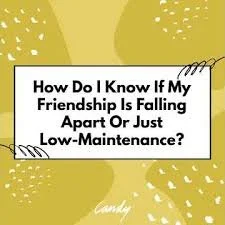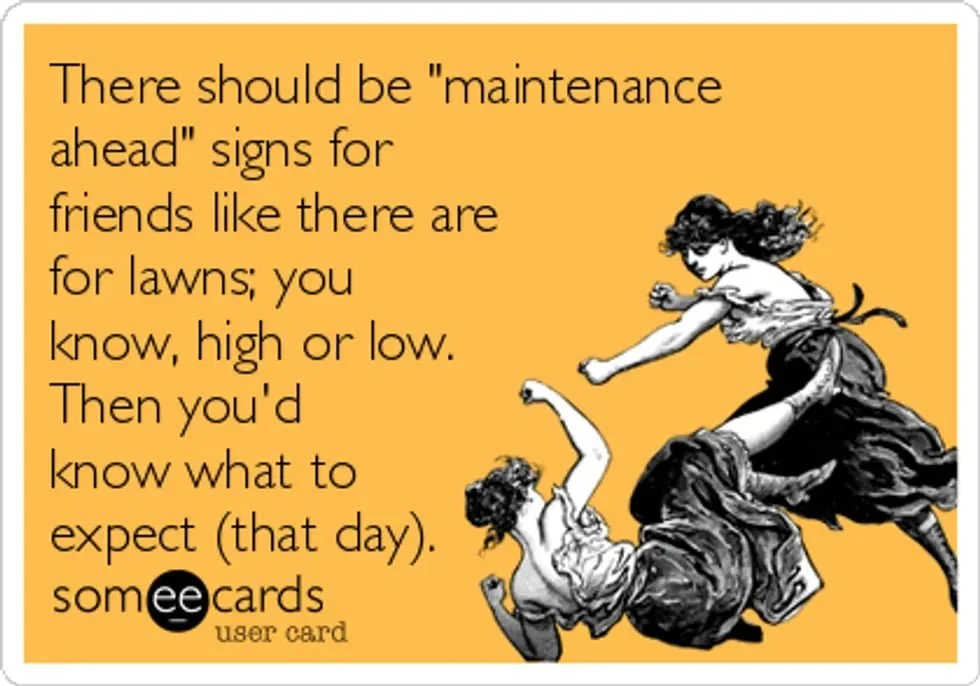Well readers, I have said it before, and I will say it again, I am not a fan of all these posts on social media that reference low maintenance friends and how they can go a whole year or more without speaking then when they do get together it is like no time has passed and nothing has changed. What’s interesting, is that despite my distaste for the sentiment, I do actually have a few low maintenance friends. Loathed as I am to admit it, the proverbial shoe does fit them. We can go for ages without speaking without any animosity, and things aren’t awkward – we’re still us, there is still love and we still consider each other friends.
So if that is the case, why have I hated this sentiment so much over the years? First of all, I hate the idea that people use this as an excuse to not prioritize their friends, and minimalize any hurt feelings this may cause on the end of a neglected friend. I also feel uncomfortable with the idea that friendships should be expected to withstand long periods of low to no effort to engage or connect, while every other relationship demands more respect. I don’t think many of us would be happy if a romantic partner didn’t see or speak to us for a year and then tried to come back around like they have just been busy, but we are still together, because we never broke up…..Most of us can’t go for a year without talking to colleagues, or our boss and wouldn’t want to go that long without interacting with family or chosen family. So why is it different with friendships?
Well I happened to be listening to a podcast the other day featuring Anna Goldfarb, author of the book Modern Friendships. Her work, based largely on the findings of research by Robin Dunbar, explains that she too was a bit confused by this conundrum. What she found transformative was realizing that we actually have 2 categories of friendships that she calls active and memorial friendships. Memorial friendships pertain to your old primary school friend, or an old work colleague etc…. These are friends with whom there is no love lost, but are not active. Meaning you don’t know what their day to day life looks like, and you get in touch periodically. You might be able to call on them in an emergency, but you probably wouldn’t because that’s not the relationship you have with them. Active friends are the ones you speak to regularly, maybe a few times a week, who you could and would call in an emergency, and who’s day to day lives you are invested in. Memorial friends tend to be the low maintenance friendships.
That doesn’t necessarily mean that your active friendships are high maintenance by default….well, not in a negative context anyway. But it does kinda mean that. You expect these friends to answer in a relatively quick timeframe when you text, and you expect them to be there when you need them. In return, you also kind of commit to them to be there for them, and care about the stuff they care about. So you know if they had a big job interview and you wish them luck that morning and ask how it went that evening. Or you have a close relationship with their kid or watch their dog when they are out of town. Active friends are higher maintenance because they give us more and ask us for more in return.
I have always said, if all of my friends were low maintenance, I would be very lonely. Yet at the same time I have also had high maintenance friends ask me why I am not upset if one friend doesn’t reply to me, yet I am upset if they don’t. As Anna herself has said in her work, and as I have said in my own, it all comes down to expectations. While I have written before that not having expectations is the secret to happiness, and I stand by this, it is easier said than done. The truth is that most of us do have expectations, and they often only show up when they aren’t met.
My own writing has tended to focus on expectations of my friends. For example, am I expecting too much, or expecting a memorial friend to respond to me like an active friend, despite my lack of effort to be active in their life? Anna tends to flip the script in her writing and focus on her friends expectations of her, for instance allowing herself to not try and be an active friend to every single person, and to make sure her expectations and actions align with the category of the friendship.
As I have always written about the magic 5 friends, Anna describes these friends as her hot tub friends. A tier of active friendships and it is with these people specifically that she holds herself to a committed standard to reply to them quickly, show up when they need her, show interest in their lives, care about the things they care about, offer help and support without being asked, and making sure they have a valid reason to stay hot tub buddies.
This commitment is what my distaste for the low maintenance vibe is all about. I do believe friendships are platonic relationships and that they do require a certain level of effort, and commitment to maintain – even when it is inconvenient. The concept of low maintenance friendships appeared to scoff at the idea. But as it turns out, those of you who are keen on the sentiment probably have fewer hot tub friends, maybe even just one bathtub bestie up there with your partner and no hot tub friends at all…. You probably lead busy full lives, and genuinely do love your low maintenance mates! While people like myself, have a few more in the hot tub, and probably way less in the pool (which is Anna’s tier down from the hot tub.)
But the point is, that most of us do have both types. Because we would be very lonely if we didn’t have anyone close and active. Even if that means, for you, that your active friendships are also familial relationships. Maybe your sibling or parent is your best friend or your parent is also your life partner (as in the adult you live with and do life with, not in an incestuous way!) And our needs in relation to this are dependent on our social situation. Which is why people like me with small insular families need more people in the hot tub, while other people with big families or demanding careers and many time constraints prefer to keep most of their friends in the pool.
And the thing is that circumstances change. You might retire from your demanding career, or move away from your big family, then find your need for more active hot tub friends is greater, and your big pool feels a bit lonely. Or I may return to work, or take up caring for my elderly parents, or grand children if I ever get any, and find I can no longer commit to so many hot tub friends, preferring the distance of the pool and lower maintenance connections. The fluid nature of our circumstances and how they impact our social needs and friendship tiers as a result is exactly why Anna chose to describe them as water features in the first place. Which is pretty clever and cool, I thought!
Ultimately, it is not a question of low maintenance friends vs high maintenance friends, because at the end of the day, what we are forgetting is that everyone has both. One isn’t better or worse, or more meaningful than the other. Both have their place. The onus is on us, to know who is in which category, and manage our actions and expectations accordingly!
❤ Love,
Your Best Friend ForNever
xx





